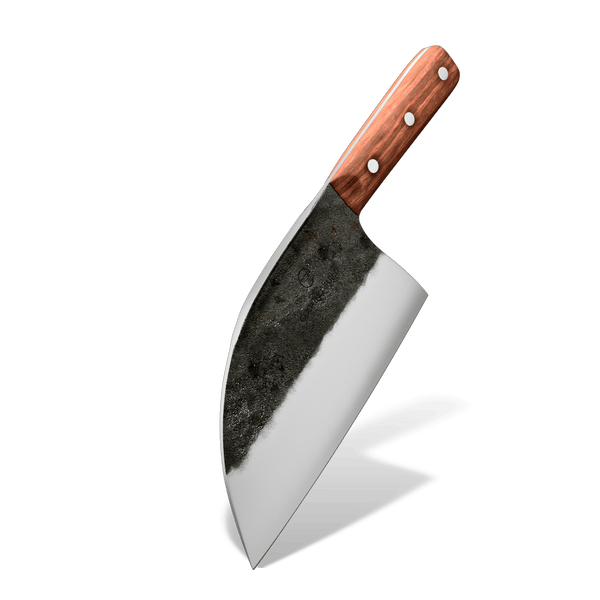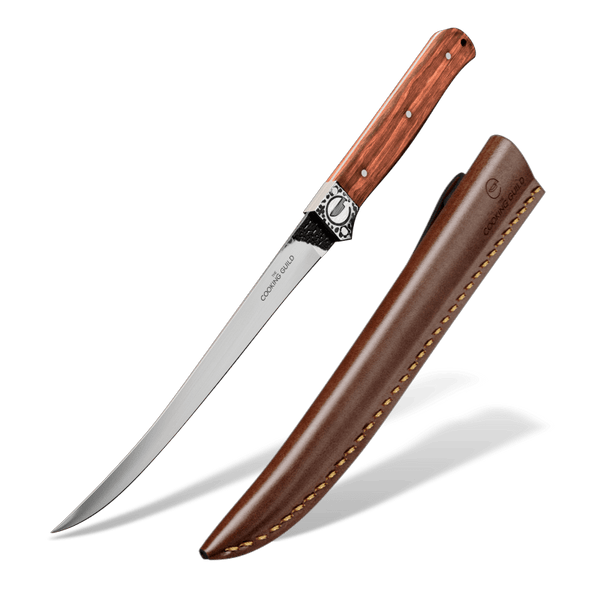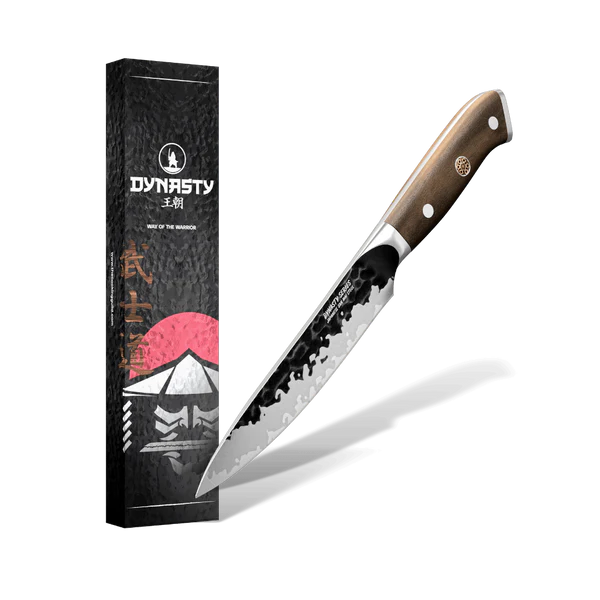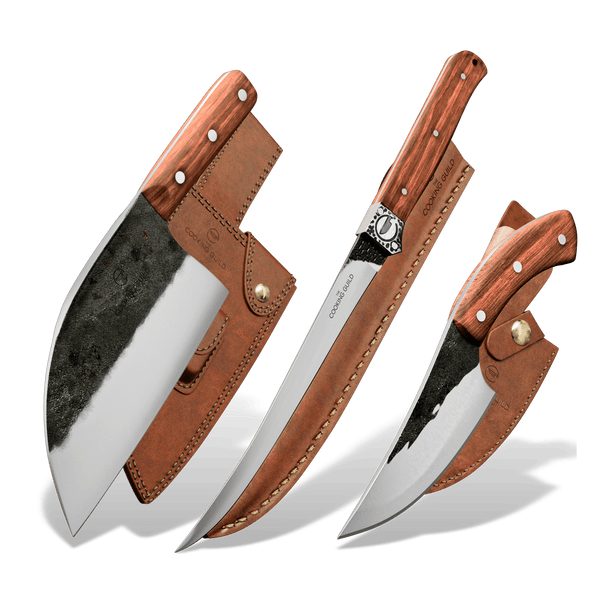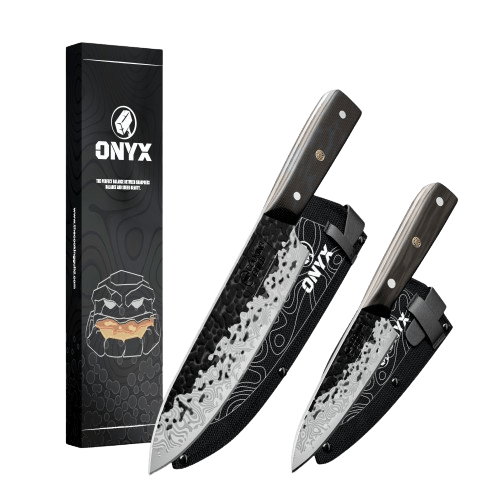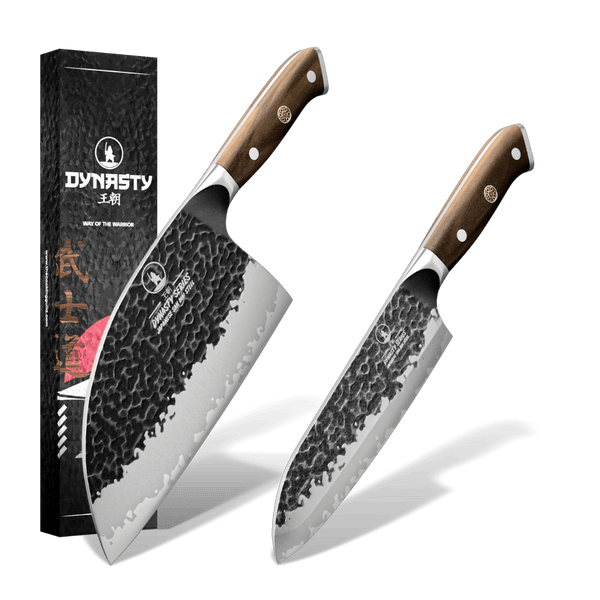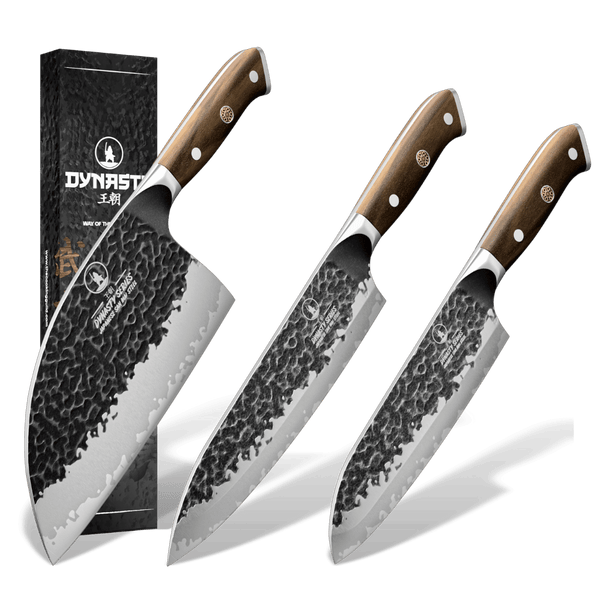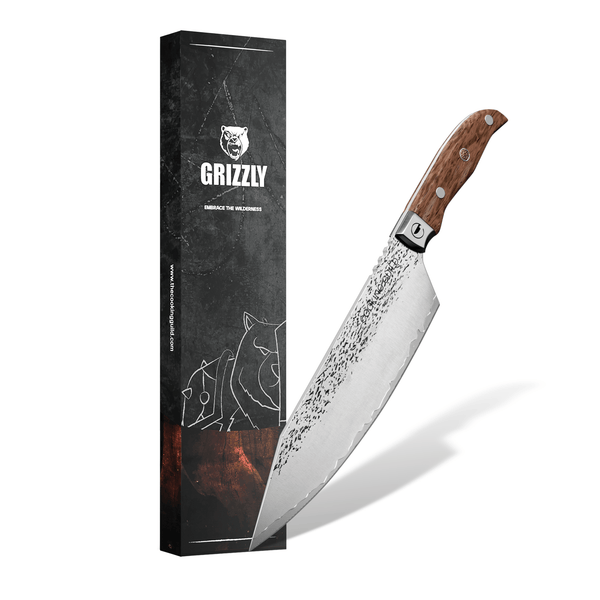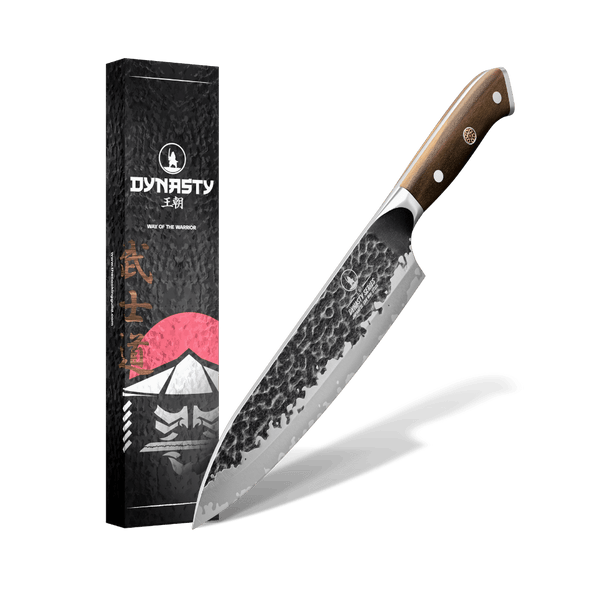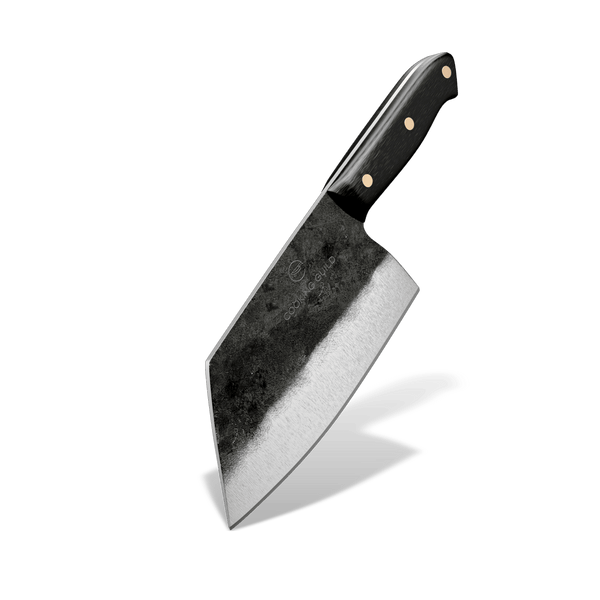Over recent years, Damascus steel has served as the most highly sought-after material for various quality kitchen knives. The steel has made a name for itself for having a rich history and offering physical benefits that back it up. A Damascus chef knife offers excellent sharpness and durability. Special qualities and a range of functionality made the knives extremely valuable to the market.
Top-Quality Damascus Steel Knives
Damascus steel knives have a formidable reputation for their unparalleled quality, resilience, and captivating visual allure. This steel variety holds a profound historical legacy, with its roots traced back to the Middle East and India.
Damascus kitchen knives are one of the top picks of any professional chef and fellow knife collectors. They offer both sharpness and hardness, with the Damascus ranging around 52-60 on the Rockwell Hardness scale, having high durability and retaining their quality over time without fear of wear and tear.
Best Overall Damascus Kitchen Knives: The ONYX Series
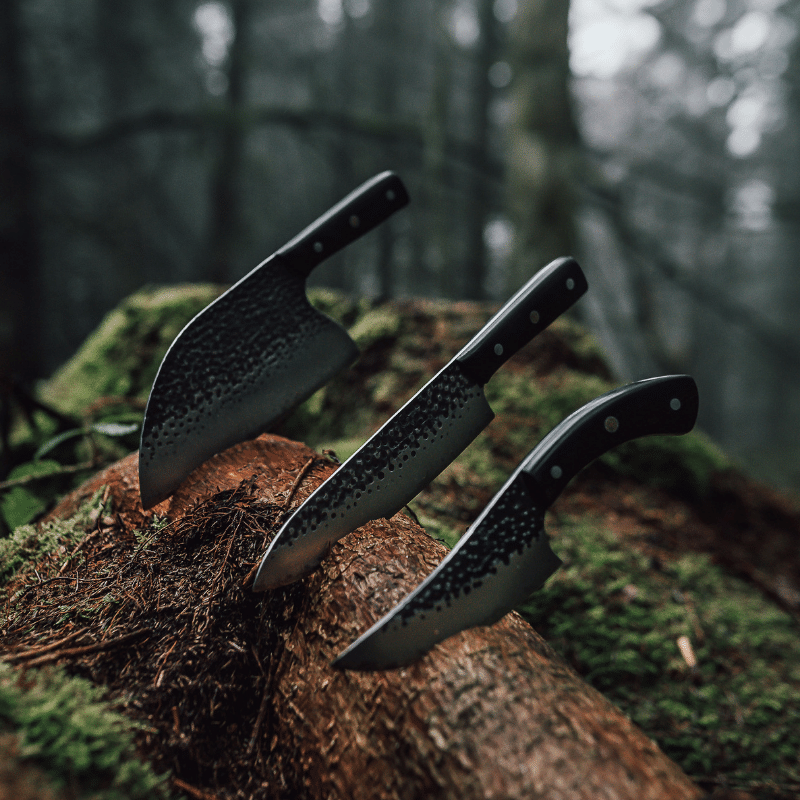
The ONYX Series represents a stunning collection of knives that seamlessly combine performance and visual appeal. As members of the Cooking Guild, we take pride in asserting that these knives epitomize our finest craftsmanship to date.
This exquisite line features a diverse array of blades, including the Serbian Cleaver, the Steel Hanta, and the highly sought-after 8” Chef Knife, each meticulously designed to cater to various culinary needs in the kitchen.
Specifications
Every knife within the ONYX Series is meticulously crafted from specially forged high carbon Damascus steel. Enhancing both the quality and ergonomic comfort, the knives boast full tang handles of polished Ebony wood, meticulously secured with intricate Mosaic pins. The ONYX Series knives possess the Rockwell Hardness Measurement of 61, making them resilient and durable kitchen utensils. All knives under the ONYX set also come with an exclusively made ONYX branded sheath and premium custom packaging.
Best Value Damascus Kitchen Knives: Damascus Steel Knife Set

For a limited time, the ONYX Damascus Steel Knife Set is now priced within an affordable range at a significant 60% discount from its original price. It's worth noting that this offer applies to the entire bundle.
Specifications
The ONYX Damascus Steel Knife Set comes with different Damascus kitchen knife types, each designed for a specific purpose in terms of slicing, mincing, chopping, and boning specific ingredients. All three knives come with a full tang, and it takes almost a year to develop them to the perfect quality. Under this set, you will have three types of knives:
Hanta Specs:
- Length: 5.5 inch / 14 cm
- Width: 2 inch / 5 cm
- Thickness: 0.8 inch / 2 mm
- Length: 4.3 inch / 11 cm
Chef Knife Specs:
- Length: 8 inch / 20 cm
- Width: 1.8 inch / 4.5 cm
- Thickness: 0.8 inch / 2 cm
- Hardness - HRC61
- Length: 4.7 inch / 12 cm
Serbian Cleaver Specs:
- Length: 8 inch / 20 cm
- Width: 3.7 inch / 9.6 cm
- Thickness: 0.8 inch / 2 cm
- Hardness - HRC61
- Length: 4.7 inch / 12 cm
Best Damascus Kitchen Knives on a Budget: ONYX Damascus Steel Essential Knife Set

For a more budget-friendly option, the ONYX Series Essential Knife Set is perfect for people looking for outstanding performing kitchen knives in the range of budget affordability.
Specifications
Both types of knives under this set are made for versatile roles and offer a balance of resilience, sharpness, and lightweight. They come with specific specifications:
Hanta Specs:
- Length: 5.5 inch / 14 cm
- Width: 2 inch / 5 cm
- Thickness: 0.8 inch / 2 mm
- Length: 4.3 inch / 11 cm
Chef Knife Specs:
- Length: 8 inch / 20 cm
- Width: 1.8 inch / 4.5 cm
- Thickness: 0.8 inch / 2 cm
- Hardness - HRC61
-
Length: 4.7 inch / 12 cm
Best Small-Sized Damascus Kitchen Knives: ONYX Hanta

Known to possess a curved blade with a razor-sharp edge, the ONYX Damascus Steel Hanta knife is the perfect tool in the kitchen or hunting game. Like its Japanese inspiration, its sharpness and ease of functionality are a cut above the rest.
Specifications
The ONYX Damascus Steel Hanta knives are meticulously forged from 1095 Carbon Damascus steel, with a stunning hammered finish gracing the blade. These knives feature a 5.5-inch blade length, 2-inch width, and an impressive 0.8-inch thickness.
Best All-Around Damascus Kitchen Knives: ONYX Chef Knife

A classical signature within any kitchen, now made to look and perform at an even greater degree. The ONYX Damascus Steel Chef Knife is a perfectly balanced utensil that can perform a wide range of slicing and dicing duties. This is the right item for you when it comes to labeling, which is the best Damascus chef knife.
Specifications
The ONYX Damascus Chef Knife is expertly crafted from premium Damascus steel, complemented by a sleek tang polished Ebony wood handle, resulting in a remarkable knife boasting an 8-inch long and 1.8-inch wide blade, with an impressive 0.8-inch thickness.
Best Damascus Kitchen Knives for Chopping Meat & Vegetables: ONYX Chef Knife

Our previous buyers recognize the ONYX Damascus Steel Chef Knife as a sharp and beautiful knife, and it does offer the quality to back those reviews up. The ONYX Chef Knife is the best Damascus chef knife right for the taking. The knife offers a razor-sharp blade that can be used in cutting or slicing through different meat and vegetables effortlessly.
Specifications
The ONYX Damascus Chef Knife is meticulously fashioned from high-grade Damascus steel, paired with a sleek, polished Ebony wood handle. This combination results in an exceptional knife featuring an impressive blade length of 8-inch-long and 1.8-inch-wide, with an impressive 0.8-inch thickness. Like any knife under the ONYX Series, the blade measures 61 on the Rockwell hardness scale, ensuring enduring sharpness and resilience.
Best Damascus Kitchen Knives for Deboning: ONYX Cleaver

The ONYX Damascus Serbian Cleaver exemplifies a harmonious blend of power, balance, and elegance. Meticulously crafted to ensure impeccable equilibrium and comfort during use, this cleaver is designed precisely. Its broad structure enables seamless deboning of thick meat and effortlessly handles the most challenging cuts, delivering exceptional performance in the kitchen.
Specifications
As part of the esteemed ONYX Series, the ONYX Serbian Cleaver boasts a commanding blade length of over 8 inches, complemented by a robust frame measuring 3.7 inches in width and 0.8 inches in thickness. Crafted from premium Damascus steel, this cleaver exhibits exceptional resilience, rendering it ideal for effortlessly tackling the toughest cuts of meat.
Best Alternative Damascus Kitchen Knives: Nomad Series Fuji Bundle

The ONYX Series is not the only knife with a unique pattern. We also offer the Nomad Fuji Bundle as an alternative to a pattern-displaying knife set. The top picks under the Nomad Knife Series are offered in this bundle:
- The 8” Nomad Cleaver;
- The 8” Nomad Chef Knife; and
- The 5” Nomad Petty Knife.
Specifications
Each Nomad knife within the Nomad Fuji Bundle features X70Cr17Mov Stainless Steel blades, burl wood, and deep sea epoxy handles. The blades are designed to provide exceptional edge retention and corrosion resistance, while the handle offers an appealing appearance with a comfortable, water-resistant grip. The distinctive blade design showcases a captivating mountain range, paying tribute to the Japanese inspiration behind the bundle.
Which Damascus Steel Is Best For Everyday Use Knives?
Selecting the perfect Damascus steel for daily knife use involves understanding that there is no one-size-fits-all solution. Different variations of Damascus steel offer distinct advantages depending on personal preferences and requirements.
Some popular types of steel used include VG-10 steel, 1080 high carbon steel, and AUS-10 steel, to name a few. Both steels are known for their exceptional strength, rust resistance, and ability to maintain sharpness over extended periods. Their high carbon content and the inclusion of elements like vanadium and molybdenum contribute to their durability and resilience, making them well-suited for everyday tasks.
Determining the best Damascus steel for everyday knives depends on the specific needs and preferences of the user. Factors such as maintenance expectations, frequency of use, and personal comfort in handling should all be considered to identify the most suitable option for one's daily knife needs.
What Exactly Is Damascus Steel?
Damascus steel refers to the name of the steel itself and the city from which the first variant was developed. The steel is heavily recognized for possessing a characteristic wavy pattern, which can differ depending on the blacksmith who forges the knife.
Damascus Steel – A Brief History
Originating from Syria, the steel was first forged in Damascus, the capital of Syria, hence why it is named as such. The unique forging methods the Middle Eastern sword makers used were lost over time. The first mention of Damascus steel dates back between 300 and 500 A.D. The steel is made with high-quality, resulting in sharp, durable blades with an artistic appeal.
What is a Real Damascus Blade?
The ancient craft of forging "authentic" Damascus steel slowly diminished over time, slipping away from the limelight and eventually fading into obscurity and drawing inspiration from the unique attributes and unparalleled artisanship of the traditional Damascus knives. Modern bladesmiths have adeptly utilized diverse techniques to recreate the remarkable outcomes once achieved by the early blacksmiths with their original Damascus steel blade variants.
Cast Damascus Steel
Damascus steel, also known as Wootz steel, traces its origins to the Middle East and India. This ancient steel was cast using Wootz, a specific type of steel developed in India. These pioneering alloys laid the foundation for the contemporary steel that remains iconic.
Fabricated Damascus Steel
Fabricated Damascus steel encompasses various steel products that are falsely represented as authentic Damascus steel. These imitations typically involve the application of acid to create patterns on the blade. Unlike the natural, flowing patterns characteristic of a genuine Damascus steel blade, these counterfeit versions exhibit uniform and regular designs.
Modern Damascus Steel
Today, the contemporary knives falling under the "modern Damascus'' exhibit a remarkable synthesis of the latest forging techniques and innovations. Modern forging techniques with the theorized methods closely mirror the historically revered Damascus steel.

Benefits Of Damascus Knives
Damascus knives offer a range of benefits ranging from high-quality appearance appeal to optimized performance. Here are the key benefits a Damascus kitchen knife and Damascus chef knife offers:
Excellent Composition: Damascus knives are popular for possessing a unique composition of iron ore and high carbon metal. This composition is even made more appealing due to the unique forging method the steel has undergone.
Strength and Resilience: Thanks to the composition and forging style, Damascus knives are also highly resistant knives that can retain their sharpness while resisting damage for a prolonged period. Cleavers made of Damascus steel can also deliver strong blows in chopping thick meat and bone.
Sharpness and Retention: Damascus knives offer high-quality sharpness and retain their edge retention even through continuous use and exposure to cutting, slicing, and mincing ingredients. The razor-sharp blade can also be used in performing accurate boning results.
Aesthetic Appeal: Renowned for its intricate patterns adorning the blade. The Damascus pattern, a testament to its distinctive forging process, is a hallmark of its craftsmanship, making the knife itself a work of art.
Versatility: Damascus steel knives serve as versatile instruments, adept at many tasks such as slicing, dicing, chopping, and executing intricate cuts with precision.
Comfort in Handle-Use: The handles are also made of quality materials to meet the same exquisite quality of the blade. This feature provides a good and comfortable grip while using the knife. The handle material can range from pakkawood to micarta,
Features To Look For
Damascus knives are widely popular and preferred by different ranges of professional chefs and average cooking enjoyers alike. It would be difficult for each specific customer to pick which option is best for their collection or daily kitchen duties. Here are some features you need to look into. You can also inquire about the official store or Amazon partners for more in-depth details.
Spot True Damascus Steel kitchen knife
Identifying a genuine Damascus chef knife amidst the sea of imitations and substandard products requires a keen eye and knowledge of the distinguishing factors. These factors include distinct patterns, unparalleled sharpness and edge retention, exceptional durability, and the esteemed reputation of the manufacturer or craftsman.
A comprehensive understanding of these critical features is vital in effectively discerning authentic Damascus steel knives from their counterfeits or lower-quality counterparts in the market.
Type of Damascus Kitchen Knives Do You Need
Damascus kitchen knives exhibit diverse types, sizes, and functions. While certain knives, like the versatile chef knife, excel in handling various ingredients, most are tailored for specific roles. For instance, a paring knife is ideal for peeling small fruits and vegetables, while a robust cleaver knife is specifically engineered to slice through thick meats and bones. Additionally, a santoku knife is ideal for chopping, dicing, and mincing due to its sharp edge being built for precision.
Steel Type And Number Of Layers
Damascus steel employs a distinctive forging technique that entails layering different steels, each with different high carbon contents and special materials. The intricate patterns closely associated with Damascus steel directly result from the specific layering process. Therefore, it is crucial to research the number of layers utilized in the forging of a particular knife or to seek additional details from the manufacturer.
Handle
The handle material is carefully chosen for its ergonomic properties, ensuring a comfortable grip. These handles are securely fastened to the blade's tang using pins and rivets affixed to the sides. A hallmark of superior handles is the presence of specially designed pins that complement the wood's aesthetic, with one popular material being pakkawood.
Think About The Size That You Want
Understanding the proportions of your hand is crucial when considering a Damascus knife, as it ensures that the knife is both too large and too small to wield comfortably. Checking the knife's dimensions or consulting the provider for a product that aligns with your specific requirements is essential.
Look At The Shape Of The Blade
A knife with a curved blade profile provides remarkable versatility, effortlessly accommodating various cutting techniques such as rocking, slicing, and chopping. Typically having a blade length of around 6 to 12 inches, a standard chef's knife strikes an ideal balance between maneuverability and an ample cutting surface, ensuring seamless culinary performance.
Blade Thickness
Achieving the perfect balance between thickness and thinness is crucial. Opting for thicker blades ensures enhanced durability and strength, making them ideal for handling more demanding cutting tasks. On the other hand, thinner blades excel at precision tasks like effortlessly slicing vegetables or delicately filleting fish.
Additional Knife Features
Ideally, hand-forged knives typically feature a bolster, which serves as a distinct edge separating the sharp blade from the handle. Additionally, a quality kitchen knife should also possess a full tang. Both features are a hallmark of traditional forging techniques.
Set A Budget
To secure your desired Damascus chef knife, set a practical budget that acknowledges the substantial investment necessary for acquiring a top-tier, exquisitely crafted blade. While genuine, high-performance Damascus knives can be on the pricier end, budget-friendly alternatives are available to cater to various preferences. Shopping through official websites or trusted platforms like Amazon can offer the added advantage of limited-time discount opportunities.

What Makes Damascus Steel So Special?
Damascus Steel is renowned for its exceptional properties that perfectly align with the desired qualities. It stands out due to its unique steel composition, significantly influencing the knives' performance. Moreover, its rich historical significance and profound influence add to its allure. Notably, the knives crafted from Damascus steel boast a superior aesthetic.
Why Is Damascus Steel So Expensive?
Damascus Steel is celebrated for its exclusivity, attributed to several key elements contributing to its premium pricing. Here are the factors that drive up the cost of a Damascus steel knife set.
- Finalized Quality: The steel's unparalleled quality and unique aesthetic significantly contribute to its price point.
- Forging Processes: The intricate forging procedure requires a significant time investment and requires exceptional artisanal expertise.
- Manpower Labor: Expert bladesmiths invest extensive labor in meticulously crafting the blade's appearance and ensuring its exceptional quality.
- Raw Materials: The expenses are further amplified due to the necessity for top-tier raw materials in manufacturing these blades.
Is Damascus Steel Harder To Care For?
Maintaining a Damascus steel knife requires attention and a more careful approach than maintaining a conventional stainless steel knife. Damascus steel requires careful cleaning, drying, and oiling onto the blade to keep its appearance and quality in check. Additionally, Every Damascus kitchen knife must be stored in dry storage where it is difficult to get wet or moist.
Is Damascus Steel Actually Good?
Regarding kitchen performance, Damascus steel knives are highly praised and favored for exceeding any professional chef’s expectations. They are good options for individuals seeking utensils that deliver efficient and accurate slicing capabilities. The steel’s ability to remain durable and retain its blade through continuous use makes it one of the most sought-after kitchen knives on the market.
In comparison, Japanese steel is crafted to offer the same qualities of holding a good edge retention, sharpness, and ease of sharpening. They are made with the same steel materials, such as AUS-10 steel or VG-10 steel, as major components. Zelite Infinity knives use Japanese steel to craft a whole array of ergonomic-designed knives.
However, compared to Damascus steel knives, A Japanese knife is known to lean more on lighter-duty tasks to provide cleaner cuts and slices onto ingredients. Both the Japanese knife and Damascus knife have their unique properties that go towards different markets.
What Is A Good Damascus Steel Knife?
A good Damascus steel knife should meet a range of specifications placed by both the manufacturers and buyers alike. The Damascus knife should display its unique pattern in all its glory, shown properly without signs of fading or damage. The knives should also pass specific testing to prove they are made to be of excellent quality.
What is a good price for a Damascus knife?
Every Damascus chef knife and kitchen knives are celebrated for its exceptional composition, crafted through traditional forging techniques that have stood the test of time. A quality knife no doubt commands a premium price range, reflecting its distinctive properties and versatile applications. While more affordable variants can be found around the $100 mark, the truly exceptional pieces, meticulously fashioned with the finest materials, can fetch prices upwards of $500. Zelite Infinity and Shun Classic are examples of high-quality knives that match their affordability. They are available at Amazon stores.
Are Damascus Knives Worth The Money?
The value of investing in a Damascus chef knife set hinges upon individual preferences and tastes. Renowned for their high performance and enduring charm, these knives exemplify functionality and beauty, promising a lifetime of durable use. These knives undoubtedly justify their price point for those seeking an optimal blend of performance and aesthetics.
